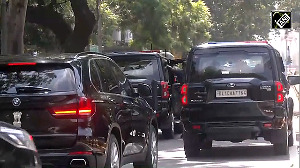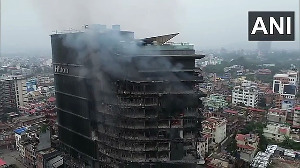Resuming the derailed dialogue process, India and Pakistan agreed on Wednesday to set up a joint anti-terror mechanism but made little headway on Siachen.
At the end of the two-day Foreign Secretary-level talks, the two sides decided to set up a three-member anti-terror mechanism to be headed by K C Singh, Additional Secretary in the External Affairs and his Pakistani counterpart Tariq Osman Haider.
Its mandate would be to consider counter-terrorism measures, including through the 'regular and timely' sharing of information, said a three-page joint press statement issued after two days of talks between Foreign Secretary Shiv Shankar Menon and his Pakistani counterpart Riaz Mohammad Khan.
Asked whether there was any progress on the Siachen issue, Khan gave no hint of it but instead made a mention of the complexities involved.
The statement merely said the two officials exchanged views on Siachen.
Menon, at a separate press conference, said India raised the cross-border links to terrorist acts in this country with Pakistan and hoped that the joint anti-terror mechanism will take some action in this regard.
He said during the talks India handed over some information to Pakistan about some recent terrorist incidents in India but not about the Mumbai blasts because a chargesheet is yet to be filed in the July 11 attack.
He said Islamabad has been told that it should take action to stop the activities of banned organisations like Lashkar-e-Tayiba from undertaking terrorist activities in India.
Khan said 'some material' was given by the Indian side but it did not relate to the Mumbai blasts.
The material referred to certain linkages of banned groups in India and Pakistan.
Menon said evidence, including documents on the Mumbai blasts, were not given to Pakistan because of the legal process involved like chargesheet yet to be filed in Mumbai court and the government did not not want to commit contempt of court.
But, he maintained, India has been discussing the Mumbai incidents with Pakistan on various occasions.
Meanwhile, Khan said, "Finger-pointing at Pakistan within 15 minutes of the incident (Mumbai blasts) is nothing but levelling accusations."
"We have resented the charge and we reject it," he said, adding there is no such advanced technology in South Asia which can ascertain within minutes who is responsible for any such attack. "For either country to destabilise the other is a dangerous folly."The press statement said the two sides exchanged views on the Jammu and Kashmir issue 'in the spirit' of the Havana decision after talks between Prime Minister Manmohan Singh and Pakistan President Pervez Musharraf.
It was then agreed that the two sides would hold 'purposeful' discussions, build on convergences and narrow down divergences.
'They agreed to fully implement measures to enhance interaction and cooperation across the Line of Control, including the early operationalisation of truck service for trade on agreed items', the statement said.
Experts from the two countries will meet on December 22-23 to decide on the coordinates for joint survey of Sir Creek and adjoining areas 'without prejudice to each other's position, as well as to simultaneously conduct discussions on the maritime boundary'.
The joint survey is to be completed by February, 2007.
The two sides initialled the agreement on reducing the risk from accidents relating to nuclear weapons and agreed on its early signing.
It was decided that, on humanitarian grounds, that all fishermen and prisoners of the other country, whose national status stood confirmed and who have completed their sentences, would be released by December 25 this year.
To overcome the complaints of delay in getting visas, the Foreign Secretaries agreed for an early finalisation of an updated visa agreement between both sides.
Menon acknowledged that there was terrorism in Pakistan and said it was upto both the countries to deal with it.
"It is the cross border links that we raised with Pakistan about acts of terror (committed in India). The joint anti-terror mechanism is one way of dealing with it. We hope it will take some action," he said.
Menon said India has conveyed to Pakistan that it should put an end to activities of groups like LeT, which is banned in both the countries, and indulges in acts of terrorism in India.
Pakistan has assured India that it would act on specific information given to it, he said.
On his talks with Hurriyat leaders on Tuesday, Khan said the main focus was on how to resolve the 'long-standing dispute' in Jammu and Kashmir.
He said the issue of demilitarisation, an idea propounded by Pakistan President Pervez Musharraf, was also discussed. It was felt that this would raise the comfort level of the people in the state.
Asked whether Pakistan Foreign Minister Khurshid Mohammed Kasuri would hold talks with his Indian counterpart during a private visit to Delhi later this month, Khan said he would not like to comment on such a trip.
Kasuri has been invited to attend the marriage of the daughter of Panchayati Raj Minister Mani Shankar Aiyar later this month.





